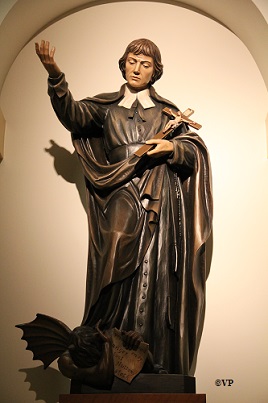St. Louis Grignion de Montfort, missionary in Brittany and Vendée
by VP
Posted on Monday April 28, 2025 at 01:00AM in Saints

Saint Louis Grignion de Montfort, Saint Catherine of Siena Catholic Church, Wake Forest
"I believe that anyone who wishes to be devout and live piously in Jesus will suffer persecution and will have a daily cross to carry. But he will never manage to carry a heavy cross, or carry it joyfully and perseveringly, without a trusting devotion to our Lady, who is the very sweetness of the cross. It is obvious that a person could not keep on eating without great effort unripe fruit which has not been sweetened." -- St. Louis Marie Grignion de Montfort (Treatise on True Devotion to the Blessed Virgin)
Louis-Marie Grignion de Montfort (b. at Montfort-sur-Meu, Brittany 31 January, 1673; d. at Saint-Laurent-sur-Sèvre, Vendee 28 April, 1716.)
From his childhood, he was indefatigably devoted to prayer before the Blessed Sacrament, and, when from his twelfth year he was sent as a day pupil to the Jesuit college at Rennes, he never failed to visit the church before and after class. He joined a society of young men who during holidays ministered to the poor and to the incurables in the hospitals, and read for them edifying books during their meals. At the age of nineteen, he went on foot to Paris to follow the course in theology, gave away on the journey all his money to the poor, exchanged clothing with them, and made a vow to subsist thenceforth only on alms.
He was ordained priest at the age of twenty-seven, and for some time fulfilled the duties of chaplain in a hospital. In 1705, when he was thirty-two,
he found his true vocation, and thereafter devoted himself to preaching
to the people. During seventeen years he preached the Gospel in
countless towns and villages. As an orator he was highly gifted, his
language being simple but replete with fire and divine love. His whole life was conspicuous for virtues difficult for modern degeneracy to comprehend: constant prayer, love of the poor, poverty carried to an unheard-of degree, joy in humiliations and persecutions. The following two instances will illustrate his success. once gave a mission for the soldiers of the garrison at La Rochelle, and, moved by his words, the men wept, and cried aloud for the forgiveness of their
sins. In the procession which terminated this mission, an officer
walked at the head, barefooted and carrying a banner, and the soldiers,
also barefooted,
followed, carrying in one hand a crucifix, in the other a rosary, and
singing hymns.
Grignion's extraordinary influence was especially apparent in the matter of the Calvary at Pontchâteau. When he announced his determination of building a monumental Calvary on a neighboring hill, the idea was enthusiastically received by the inhabitants. For fifteen months between two and four hundred peasants worked daily without recompense, and the task had just been completed, when the king commanded that the whole should be demolished, and the land restored to its former condition. The Jansenists had convinced the Governor of Brittany that a fortress capable of affording aid to persons in revolt was being erected, and for several months five hundred peasants, watched by a company of soldiers, were compelled to carry out the work of destruction. Father de Montfort was not disturbed on receiving this humiliating news, exclaiming only: "Blessed be God!"
This was by no means the only trial to which Grignion was subjected. It often happened that the Jansenists, irritated by his success, secured by their intrigues his banishment from the district, in which he was giving a mission. At La Rochelle some wretches put poison into his cup of broth, and, despite the antidote which he swallowed, his health was always impaired. On another occasion, some malefactors hid in a narrow street with the intention of assassinating him, but he had a presentiment of danger and escaped by going by another street. A year before his death, Father de Montfort founded two congregations - the Sisters of Wisdom, who were to devote themselves to hospital work and the instruction of poor girls, and the Company of Mary, composed of missionaries. He had long cherished these projects but circumstances had hindered their execution, and, humanly speaking, the work appeared to have failed at his death, since these congregations numbered respectively only four sisters and two priests with a few brothers. But the blessed founder, who had on several occasions shown himself possessed of the gift of prophecy, knew that the tree would grow. At the beginning of the twentieth century the Sisters of Wisdom numbered five thousand, and were spread throughout every country; they possessed forty-four houses, and gave instruction to 60,000 children. After the death of its founder, the Company of Mary was governed for 39 years by Father Mulot. He had at first refused to join de Montfort in his missionary labors. "I cannot become a missionary ", said he, "for I have been paralyzed on one side for years; I have an affection of the lungs which scarcely allows me to breathe, and am indeed so ill that I have no rest day or night." But the holy man, impelled by a sudden inspiration, replied, “As soon as you begin to preach you will be completely cured.' And the event justified the prediction. Grignion de Montfort was beatified by Leo XIII in 1888." Catholic Encyclopedia 1910
Canonized: 20 July 1947 by Pope Pius XII